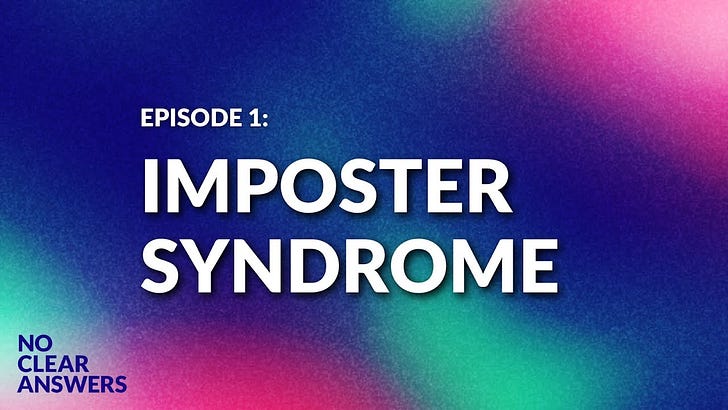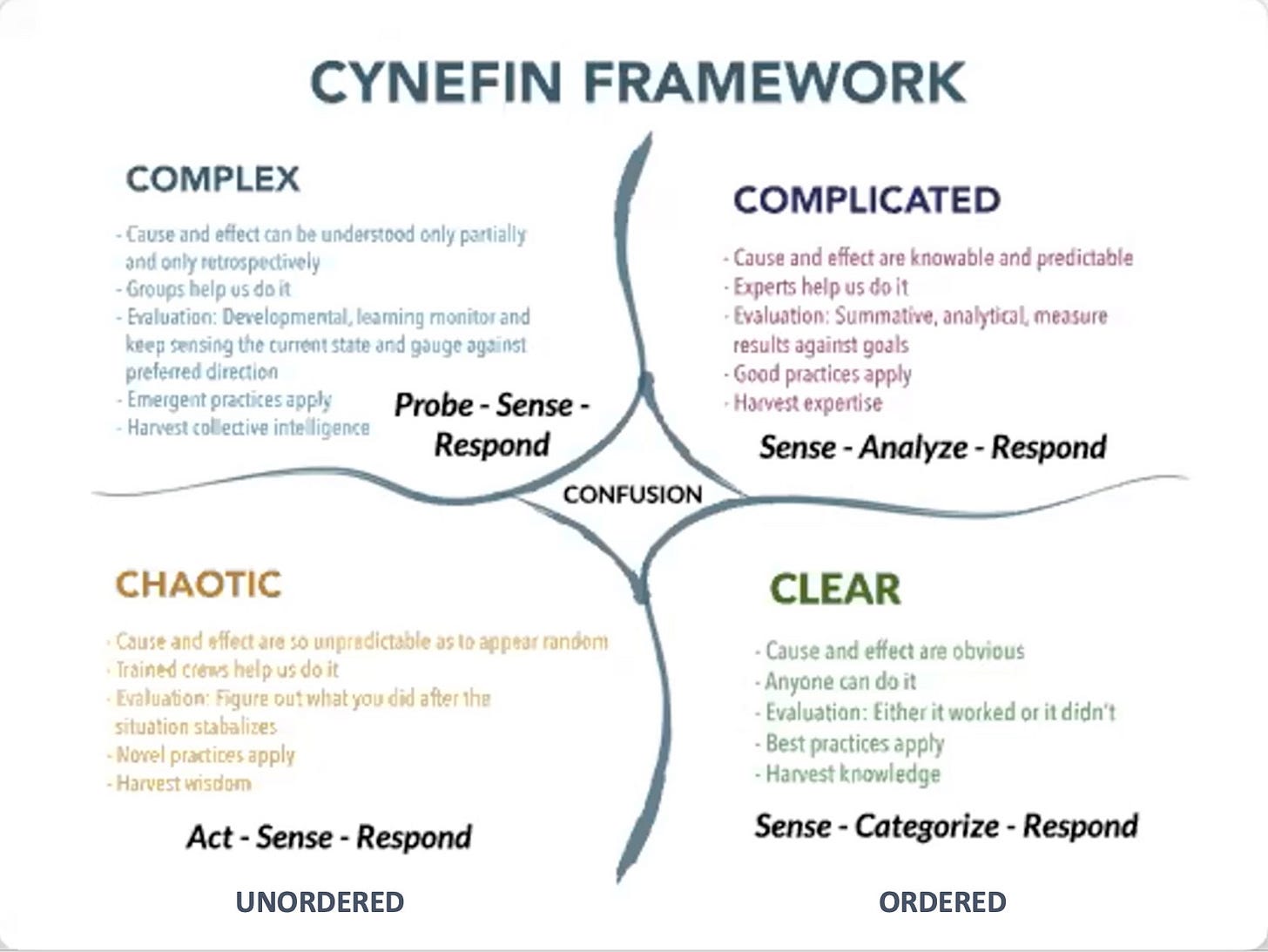If you enjoy reading the Leadership Lab, feel free to click the ❤️ or 🔄 button above so more people can discover it on Substack 🙏
Imposter Syndrome might be the single most self-diagnosed and widely experienced psychological phenomenon in our culture today.
I like how the term has helped us put words to a universal experience of uncertainty and self-doubt.
But I dislike it for so many more reasons.
The term Imposter Syndrome isn’t particularly informative. It doesn’t help me understand where the self-doubt is coming from.
In fact, it frequently does the opposite. We say “It’s just Imposter Syndrome”, and stop our inquiry there.
On the first episode of No Clear Answers, we dove into Imposter Syndrome. Where does the term comes from? Why do we experience it? How is and isn’t it in service of us as we grow?
Below, you’ll find a summary of my favorite points.
Apple:
:Spotify:
Welcome to the Club: Imposter Syndrome is Universal
One of my favorite points was made early in the episode, from the one and only Rikki Goldenberg.
After Corey and I voiced our frustration with the vagueness and inefficacy of the term Imposter syndrome, Rikki provided an alternative viewpoint:
“When someone comes to me and says I’m feeling Imposter syndrome, my response is not bullshit and it’s also not ick, it’s Welcome to the Fuuucckkiiing cluuuuub.”
The point is simple but profound—your experience of imposter syndrome is not a sign that there is anything uniquely wrong with you or your situation. You and, as Rikki said—everyone at the frickin’ party—experiences it.
Uncertainty and self-doubt are normal parts of playing a big game. In fact, these things showing up can be interpreted as a positive sign, as they signify you’re on a growth edge.
Imposter Syndrome is a sign that you are in the club of people pushing themselves in the arena. It’s a natural signal of growth, and that you’re operating outside of your comfort zone.
Next time you’re experiencing imposter syndrome see if, for just a moment, you can make that a good sign, a natural result of you being out on a growth edge, rather than a sign that anything is wrong.
Nobody Knows what they’re Doing…
Later in the episode, Corey tells a story about what happened when he was training as a psychologist that made it so he never struggled from Imposter Syndrome again:
“The sole reason I do not have Imposter Syndrome ever, for anything I ever do, is when I was in graduate school I did an outreach event for people struggling with homelessness… I remember walking up and I went up to two of my supervisors and I said ‘They’re struggling with homelessness, they don’t need deep breathing exercises. They’re fighting for their lives. I don’t belong here. I don’t belong in this room.’ I went up to those supervisors who, between them, had 50 years of experience and went ‘when does this feeling of, I don’t know what I’m doing go away?’ and they said ‘We’ll let you know’.”
Nobody fully knows what they’re doing. Even those at the top of their craft regularly encounter challenges that they don’t know how to overcome. The difference is, they expect that. They know that’s part of the game. And they don’t make it mean anything more about themself.
Corey ends with a great point: You’re allowed to say you don’t know what you’re doing— but make it a comma instead of a period: I don’t know what I’m doing, AND I’ll figure it out.
Except for some people, in some situations…
Now you might be saying, some people know what they’re doing…
And you’d be right!
In certain domains, people absolutely know what they’re doing.
But the key is in that last point: in certain domains. And for understanding that better, I shared one of my favorite models for understanding the world and complexity, Cynefin (you may remember it from my post on Thriving in Complexity).
Cynefin describes five environments, but for our purposes I’ll only describe the first three:
Clear. In clear environments, cause and effect are obvious. Anyone can solve problems. It’s obvious if problems are effectively solved or not. Here we should apply best practices: there is a clear best way to do things, and that is how we should do it.
Complicated. In complicated environments, cause and effect are knowable and predictable, but take some analysis to understand. It’s best to lean on experts here: there is no single best path, but many possible paths which trained experts will likely know. An example of this might be hiring an accountant to do your taxes.
Complex: In complex environments, cause and effect can only be partially understood and discerned after action has been taken. In complexity, experimentation and learning are essential. Emergent practices are best—we must discover what works. Leaning on collective intelligence (multiple perspectives) is an essential strategy. An example of this is introducing a new innovative technology to market.
For Clear environments, think of a cashier. Once this person is trained, they absolutely know what they’re doing. Their job is fairly simple and follows rules of linear cause and effect.
For Complicated environments, think of an accountant. Linear cause and effect and clear rules apply, but there are a lot of rules. An accountant can know what they’re doing, but needs a robust set of knowledge to understand how to navigate the system accordingly.
For Complex environments, think of Entrepreneurship, Leadership, or bringing anything new to market. Linear cause and effect don’t apply. Sure, there are helpful principles, but you can’t know what will work until you try it. In complex domains NOBODY KNOWS WHAT THEY’RE DOING. You can’t know how things will go in advance.
Certainly, some people are more skilled at navigating complex domains. But that doesn’t mean they know what they’re doing. It’s just that they understand that not knowing what you’re doing is a regular part of the game, and they don’t make that a problem.
The Roots of Imposter Syndrome
Where does Imposter syndrome come from? Corey, Rikki, and I each explored different origins based on the type of people we work with.
Comparison
As a creator coach, Corey frequently works with content creators at the beginning of their journey.
One big mistake early creators make is comparing themselves at the beginning of their journey to their favorite creators who are many years into their own.
Even if you’re not a creator, I’m certain you’ll find value from the soundbite:
In psychology, Corey explains, we can make Upward or Downward Social Comparisons.
An Upward social comparison is when I compare myself to people I perceive as being ahead of me or further along on the journey. If I only make upward social comparisons, I experience myself as being inadequate.
A Downward social comparison is when I compare myself to people who are behind me, or earlier in their journeys. If I only make downward social comparisons, I become arrogant and narcissistic.
The trick, Corey explains, is to find a balance of upward social comparison to inspire yourself to be better, and downward social comparison to acknowledge how far you’ve come.
If you’re struggling with Imposter syndrome, a good question to ask might be: Who are you comparing yourself to, and is that in service of you?
Fear
With leaders, I usually find that the root of Imposter Syndrome is fear, often of something very specific.
You experience a new challenge, often something you’re doing for the first time and, naturally, some fear shows up.
The fear is no problem. It’s actually an intelligence that wants to help you pay attention, just like the fear you feel when you first learn to ride a bike.
But we often make meaning out of the fear. We make it a bad thing. We make it mean we’re unequipped and unqualified, that if we were good enough we wouldn’t experience fear. Self-doubt and uncertainty creep in. And just like that — we think that we’re a fraud. An Imposter.
If you follow the chain,
Imposter Syndrome comes from Self-doubt which comes from Fear, often of something very specific.
And so if you’re struggling with Imposter Syndrome, another good question is: What are you afraid of, specifically? Are you making that fear a problem? How can you start to work on that specific challenge?
Growth
Rikki loves Imposter syndrome. She believes Imposter Syndrome is the natural discomfort that comes with growth and crossing the threshold into the unknown.
When viewed that way, Imposter Syndrome is something to be celebrated!
Rikki also discusses the intelligence of Imposter Syndrome: Imposter Syndrome is a pointer. It’s telling you there’s something to be learned.
And actually, it may be telling you that there’s an opportunity to get supported. If you don’t know, maybe it’s time to get help from someone who knows better.
Some final good questions to ask: What’s the growth edge? Do I have any resources that can support me in my growth?
Working with Imposter Syndrome
Our summary at the end of the episode was this:
Imposter syndrome is BS. You’re afraid and out on a growth edge (and that’s no problem).
So what can you do when you’re struggling with Imposter syndrome?
Here are some things to experiment with:
Determine the edge. Where do you experience that you’re in the known and where are you in the unknown? Celebrate the ease and comfort of the known, and explore what risks you want to take and the support you’d like for the unknown.
How are you comparing? What comparison games are you playing? Can you create a balance of upward and downward social comparisons? Can you acknowledge your relative strengths and the areas where you want to improve? Can you acknowledge what you’ve accomplished so far and how far you’ve come?
What specifically are you afraid of? Where are you afraid of making the leap? Find the specific place where you’re getting stuck. Are you making the fear a bad thing? Try walking forward with the fear and getting started.
Orient toward your purpose. Imposter syndrome can be a symptom of being overly self-consciousness. One good way to escape that is to orient toward who you want to serve, why, and how. Be it your family, team, or customers, focusing your energy on serving them can break you out of Imposter syndrome.
Find someone with your problem and coach them. Frequently, you can more easily tap into your inner wisdom when you see someone struggling with your own problem. Find them, offer to listen and reflect, and see if you can swallow your own advice. You may not even need another person for this— imagine a friend is struggling with this and see what you’d say!
Thanks for reading. If you want to dive in more, you can watch or listen to the whole episode at:
Apple:
Spotify:




